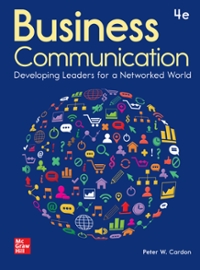In a Forbes magazine article called Worst Words to Say at Work, business consultant and psychotherapist Linda
Question:
In a Forbes magazine article called “Worst Words to Say at Work,”
business consultant and psychotherapist Linda Durre listed nine words or phrases that show someone is not confident.9 These phrases, according to Durre, cause others to perceive you as undependable and untrustworthy. To read the article, go to www.forbes.
com/2010/04/26/words-work-communication-forbes-woman-leadershipcareer.
html. Then respond to each of the following, which are excerpted from her article, with four to five sentences about whether you agree or disagree with her point of view:
A. Try is a weasel word. “Well, I’ll try,” some people say. It’s a cop-out. They’re just giving you lip service when they probably have no real intention of doing what you ask.
B. Whatever—This word is a trusted favorite of people who want to dismiss you, diminish what you say, or get rid of you quickly. . . . It’s an insult and a verbal slap in the face. It’s a way to respond to a person without actually responding.
C. Maybe and I don’t know—People will sometimes avoid making a decision and hide behind these words. Sometimes during a confrontation people will claim not to know something or offer the noncommittal response “maybe,” just to avoid being put on the spot.
D. I’ll get back to you—When people need to buy time or avoid revealing a project’s status, they will say, “I’ll get back to you,”
and they usually never do.
E. If—Projects depend on everyone doing his or her part. People who use if are usually playing the blame game and betting against themselves. They like to set conditions rather than assuming a successful outcome.
F. Yes, but . . . —This is another excuse. You might give your team members suggestions or solutions and they come back to you with “Yes, but . . .” as a response. They don’t really want answers, help, or solutions.
G. I guess . . . —This is usually said in a weak, soft-spoken, shouldershrugging manner. It’s another attempt to shirk responsibility—
a phrase is muttered only when people half agree with you, but want to leave enough leeway to say, “Well, I didn’t really know.
. . . I was only guessing.”
H. We’ll see . . . —How many times did we hear our parents say this? We knew they were buying time, avoiding a fight or confrontation, or really saying no.
Step by Step Answer:






